Our Mission
We envision a world in which schools engage students in meaningful learning, in which teachers are freed as entrepreneurs in their classrooms, and in which students can become the best version of themselves, given each students’ unique capacities, needs, and passions.
The Acera school day program provides students with unbounded access to learning, offering gifted students opportunity according to their ability not age. The Acera community, across all its programs and partnerships, learns, discovers, and explores at a pace appropriate to each child’s unique motivation and potential. Our culture is not about pressure; it is about freedom. We keep alive students’ innate curiosity and love of learning. We also partner with organizations beyond our walls, creating programs rich in sciences, technology, engineering, creativity and arts. We operate both as a lab school and a microcosm of what is possible for other schools. We seek to grow students’ emotional intelligence and enable them to become the best version of themselves.
Our mission, across our core school day program, enrichment programs and partnerships, is to develop the next generation of innovators, leaders and creative thinkers who can make a positive impact in the world.
Our Teaching Philosophy
Learn Based Upon Ability
We believe that all students should have a chance to learn at a pace and in a way congruent with their individual ability. We aim to keep students engaged and challenged by meeting them where they really are—not where they should be based on their age. Acera’s flexible ability groupings in math and reading allow students to work at their own pace, and engage in learning and discussion with like-ability peers.
Individualize Learning
We see age norms and curriculum frameworks as a reference point—not the goal—as we customize individual learning plans (ILPs) and experiences that engage each child both as part of a school community and in a way that honors their capacities and interests. Acera employs assessment, ILPs, differentiated instruction, independent projects, and flexible groupings to enable a customized learning experience for each student.
Integrate Learning
Topics and ideas are explored within a larger context, as teachers customize curricula built around essential questions and define projects and culminating events in which all facets of learning can be developed concurrently and connected to broader topics of inquiry. This enables students’ development of systems thinking capacities, while garnering knowledge in all areas (history, science, engineering, economics, philosophy, world religions, geography) in a meaningful framework.
Along the way, as students ask questions or initiate project ideas, teachers facilitate and tailor the learning pathway to align with high engagement topics. Taking a thematic approach and honoring students’ interests enables them to have a higher sense of purpose in their learning, to be motivated to make progress and gain skills in their areas of deficit, and to have a high sense of engagement—and joy—at school. Real projects are hatched from this inquiry-rich approach and are conducted in partnership among students and teachers, enabling students to test out the impact they can have in their immediate community.
Early & Deep Exposure to STEM Topics
At Acera, students as young as five engage in concepts like engineering, computer science, technology, life sciences, and more. These, we believe, are the keys to unlock student potential and empower them to take on the jobs and challenges of our time.
Build Social & Emotional Intelligence
Acera seeks out future leaders, scientists, artists, mathematicians, musicians, writers and explorers alike. We believe intelligence comes in many forms, and we focus on each. We focus on developing the whole child, with emphasis on each child’s social and emotional well-being. We embrace Daniel Goleman’s theory of Emotional Intelligence, and believe EQ is just as important as IQ. We emphasize social responsibility, self-awareness and character development, encouraging students to make a positive impact in their communities.
Enable Creative Problem-Solving & Complex Thinking
The Acera philosophy emphasizes analysis, synthesis, evaluation, and creative application of ideas to other domains—the top levels of Bloom’s Taxonomy—instead of focusing solely on “knowledge.” We expect 80% of class time to be spent in the realm of complex thinking; during these times, students are engaged in asking, writing, solving, and making. With teachers as coaches and guides, students experience Acera’s walls as porous to the world beyond and engage in new and complicated topics that align with ideas and innovations current in the world and not limited by any text or teacher. Who are we to say what students of today will need to “know” when they are adults? We believe that the role of school is to develop students’ capacities to engage effectively within teams, solve problems, and to persist through challenges, all while keeping their innate curiosity alive.
Safeguard the Spirit & Curiosity of Each Student
Core to Acera’s mission is to offer each individual the freedom to pursue interest, nourish curiosity and foster exploration. In addition to Individualized Learning Plans, each student has a chance to further pursue an area of particular interest. Every Wednesday, students partake in “Creativity” electives. In Upper School, all students bring alive their own “Inquiry, Maker, Passion” project, but from a unique personal interest and aligned with a mentor whose background is well suited to offer them support through the process. And each year, Acera holds culminating events where students showcase their work.
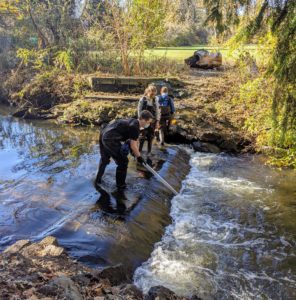 Watershed Investigations: According to the Environmental Protection Agency, over $450 billion in foods, fiber, manufactured goods, and tourism depend on clean and healthy watersheds. Why are watersheds so important? What ecosystem services does a watershed provide to our community? How can we protect our watershed? Through an ecocentric lens, this class will attempt to answer these questions. Through inquiry and investigation, we will explore the watershed where Acera is located–the Mystic River Watershed.
Watershed Investigations: According to the Environmental Protection Agency, over $450 billion in foods, fiber, manufactured goods, and tourism depend on clean and healthy watersheds. Why are watersheds so important? What ecosystem services does a watershed provide to our community? How can we protect our watershed? Through an ecocentric lens, this class will attempt to answer these questions. Through inquiry and investigation, we will explore the watershed where Acera is located–the Mystic River Watershed.
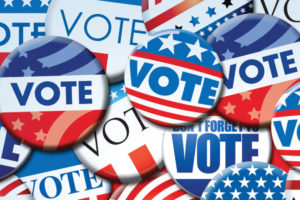 U.S. Government: The US Government elective will be somewhat different from what it has been in past years. We are in for a potentially wild ride electorally this fall, with numerous factors coming into play in our elections that have never come into play before. We will track as many of these factors as we can, as well as new ones that will probably spring up unexpectedly. Along the way, we will also learn about the basics of the Constitution, the structure and powers of state governments, and the history of voting rights and technologies in the United States. This class will also be an opportunity to dive into at least some of the questions you have that I may not have considered yet. By the end, you should have a reasonably solid foundation for understanding the results of the November elections.
U.S. Government: The US Government elective will be somewhat different from what it has been in past years. We are in for a potentially wild ride electorally this fall, with numerous factors coming into play in our elections that have never come into play before. We will track as many of these factors as we can, as well as new ones that will probably spring up unexpectedly. Along the way, we will also learn about the basics of the Constitution, the structure and powers of state governments, and the history of voting rights and technologies in the United States. This class will also be an opportunity to dive into at least some of the questions you have that I may not have considered yet. By the end, you should have a reasonably solid foundation for understanding the results of the November elections.
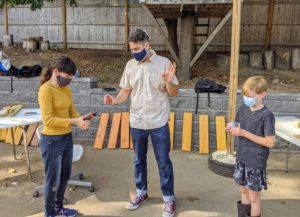 Build a Winter Garden: Do you enjoy gardening and wish it lasted all year long? Did you ever want to eat a fresh carrot right out of the ground in January? With a little planning and careful selection of plants, you can plan and build a winter garden. In addition to building one, you will also learn about their history and important role in sustaining ecosystems year round.
Build a Winter Garden: Do you enjoy gardening and wish it lasted all year long? Did you ever want to eat a fresh carrot right out of the ground in January? With a little planning and careful selection of plants, you can plan and build a winter garden. In addition to building one, you will also learn about their history and important role in sustaining ecosystems year round.
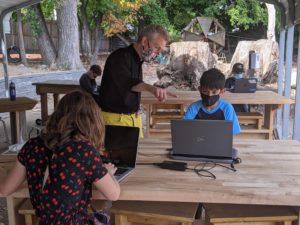 Outdoor Augmented-Reality Game Design: If you have played Pokemon Go, you already know something about location-based augmented reality (LBAR) games. Would you like to design and develop your own LBAR? Using the online TaleBlazer platform (with a Scratch-like coding environment), you will create and playtest mobile games of varying complexity for the Acera playground; your games will incorporate physical features of the play-space, both natural and human-made. At each stage of development, you and your classmates will be able to playtest each others’ games (on separate devices); both singleplayer and multiplayer modes are feasible. If technical resources allow, you may also translocate your game to be played in Davidson Park. Previous coding experience is not required, though some familiarity with Scratch is helpful.
Outdoor Augmented-Reality Game Design: If you have played Pokemon Go, you already know something about location-based augmented reality (LBAR) games. Would you like to design and develop your own LBAR? Using the online TaleBlazer platform (with a Scratch-like coding environment), you will create and playtest mobile games of varying complexity for the Acera playground; your games will incorporate physical features of the play-space, both natural and human-made. At each stage of development, you and your classmates will be able to playtest each others’ games (on separate devices); both singleplayer and multiplayer modes are feasible. If technical resources allow, you may also translocate your game to be played in Davidson Park. Previous coding experience is not required, though some familiarity with Scratch is helpful.
See full list of Fall 2020 Electives.
Catalyze Student Initiative
Acera functions as a “lab school” where we can invent, pilot, and improve on educational pedagogy, curriculum, and practice. We strive to cultivate student initiative, and then develop students’ skills to be able to do or create something that authentically connects to the world outside the classroom.
Acera’s core values of community, openness, integrity, curiosity and innovation play a key role in our approach to behavior management. We believe in giving students space to experiment, observe themselves, improve, grow and learn.
Core Values & Capacities
Community
Respect others. Support others to become the best version of themselves. Use talents to make a positive difference. Love children. See and leverage strength in diverse skills and varied ways of seeing the world. Understand where others are coming from and respect alternative points of view.
Openness
Have a humble heart and an open mind. Communicate with truth and compassion. Accept yourself and others. Communicate to share information, not just on a need to know basis. Have awareness about and tolerance of different styles.
Curiosity & Innovation
Discover, innovate & learn with a voracious mind. Maintain a sense of wonder in our world. Enable freedom and joy in learning, with choices, control & sense of purpose in learning. Encourage others to think, engage, and come up with their own ideas. See challenges as opportunities. Uncover possibilities and pilot new approaches with courage. Encourage risk taking. See struggle and failure as part of learning. Iterate.
Integrity
Be accountable: do what you say you will do, and do the right thing. Make decisions based upon your values. Honor yourself and your own personal potential by challenging yourself to do your best. Use your judgment and do what is right. Develop self-awareness and knowledge of boundaries.
Leadership
Model our beliefs within our actions. Allow others to take ownership; empower others to become their best selves. Inspire a shared vision about what is possible. Listen to others. Find your inner tenacity; be flexible and resilient. Face difficult situations and make tough decisions with integrity. Earn the trust of others.
Systems Thinking
See the whole picture and its parts across social, cultural, societal, scientific, and historical perspectives. Understand the interconnectedness of forces and actions.
Perspective Taking
Awareness that the place and experiences of the viewer fundamentally affects what and how they see. Develop capacity to see through the eyes of others.
Critical Thinking & Problem Solving
Inquire deeply, analyze and relate different aspects to each other, break things down and recombine them to assess a situation and address a need
Collaboration
Work with others to create something and to achieve a result that supersedes the contributions of any one individual.
Creativity
Free thought and inquiry resulting in original work or novel approaches to express an idea. Divergent thinking and creative problem solver.
Emotional Intelligence
Self-awareness to know your gifts and challenges, self-regulation to control impulses and focus your potential, awareness of the impact of self on others, and capacity to read the group and take the role that is needed.
Ethical Decision Making
Make decisions and choices according to values, morals, and a sense of what is right.
Leadership
Empower to see needs and step forward to make a difference. Rally others in relevant ways with original ideas (and/or against real world needs). Realize a vision for change and combine the contributions of others to bring it to life.
Our interdisciplinary, project-based and hands-on program is created by our core classroom teachers. Year to year, different essential questions become thematic jumping off points. Questions are complex and engaging, and have included: What makes us human? What is the origin of life? How do we design and redesign in our environment to solve problems? What defines a civilization? An authentic inquiry approach in classroom discussions opens students’ minds and creates a sense of purpose in learning.
Based upon the interests and profiles of each particular class group, teachers initiate and evolve their program through the year to both assure growth in academic skills and the development of Core Capacities. Sample past units have focused on:
- Civilization, society and origins of humankind including the Big Bang, religion, and more
- Energy and Newtons’ laws of motion
- What makes us human with deeper focus areas about governments and the human body as a system
- Ancient Egypt and emergence of culture
- Climate change and the industrial revolution
- Structural engineering, Haiti, earthquakes and questions of global health
Classroom experiences and projects showcase and expand students’ learning in the arts, lab sciences, engineering, computer science, applied technology, wood shop, and electronic arts. Teachers also expand students’ exposure to innovators in related fields, integrating external curriculum collaborators to enrich student learning.
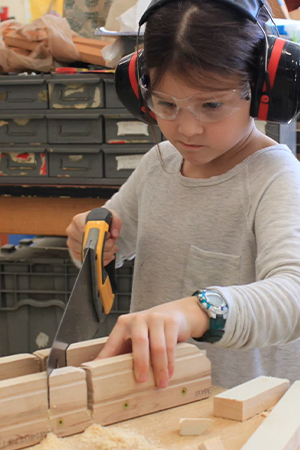
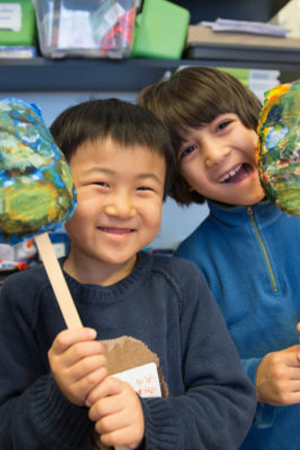
Core and Specialist teachers partner to develop projects that fit their themes. Ongoing assessment, portfolio creation, and projects emerge from these themes Projects include:
- Build scooters and see saws to showcase their learning about Newton’s Laws of Motion while learning new wood shop skills.
- Dissect a cow heart to have a more deep understanding of cardiology and human systems.
- Author their own class play to showcase their understanding of how ancient and modern societies are different, while also making their own props, costumes, music and script.
- Build their own bridges and present them to showcase their structural engineering knowledge while practice creative thinking, teamwork, and presentation skills.
- Write advocacy letters to governmental representatives about topics they have become committed to through their study of the U.S. Constitution, and create an app to give elementary students access to an annotated version of the Constitution.
- Create mini museums to showcase their learning in geology and ecosystems. > Design and paint murals to beautify the playground while depicting themes about protecting the environment.
- Invent and implement service learning projects to raise awareness about issues of importance for societal health.
Each year brings fresh projects and possibilities, and new ways that students take initiative to improve their world. Students experience school as a place to engage, learn, solve problems, and change things to make their school, community, and the world better.
Our Upper School Program extends the Lower School program approach and philosophy, optimizing the transitional time between childhood and early adulthood. Students learn through dialogue, readings, projects framed by teachers, projects initiated by students, and through authentic experiences of leadership and engagement in the community of the school and the world beyond our walls.
Program Purpose
This program seeks to:
- Develop a sense of identity, voice, and confidence.
- Build students’ perspective taking and systems thinking skills.
- Enable students to become a best version of themselves—invested citizens who can make a positive impact within our community and world.
- Foster accountability and organizational abilities to concur with this middle-years stage. Develop creative problem solving, initiative, collaboration, and innovation capacities.
- Encourage emotional intelligence attributes—recognition of the impact they have on their community, accountability, capacity to navigate ambiguity and tolerate frustration, capacity to self advocate, and leadership.
Outcome
In tandem with a significant focus on the development of academic skills (writing, mathematics, deep reading, complex and critical thinking and problem solving, technological proficiency, and capacity to articulate and follow through on projects), we focus on developing core capacities (systems thinking, perspective taking, moral and ethical decision making, critical thinking and problem solving, creativity, emotional intelligence and leadership). These capacities consistently enable Acera students to readily transition and thrive in high school.
Ultimately, we focus on preparing students for life. We emphasize self knowledge about shortcomings and strengths and emergence of students’ self advocacy and unique voice. We engage students to initiate and lead in a way that aligns with their unique potential as problem solvers, innovators and leaders who can make a positive impact in the world.
Program Components
Classroom Theme Time: A mix of humanities rich and project based learning built around the essential questions of the year, with identified projects and culminating events as various as a class play, government advocacy outreach, or a community event brought alive by the class. Through discussions, literature groups, dialogue, writing and rewriting, debate, projects, and experiences, the essential questions framed during the year come alive (e.g., What does it mean to be human? What is the origin of things? What does it mean to be free? ).
Math: Ability based placements include math courses in pre-algebra, algebra/algebra II/linear algebra, applications and statistics, discrete math, number theory and proofs, geometry, precalculus, and independent study. Learn more about our middle school program math curriculum.
Health & Wellness: Discussions and activities to promote students’ development of identity, emotional intelligence, and awareness. Sex education programming is adapted from OWL (Our Whole Lives) curriculum.
Science: Biology, chemistry, biochemistry, and hands-on science lab experiences that mirror the way scientists actually work in a lab, rather than following a textbook-based approach. New scientific learning topics and tools are piloted within each year, reflecting our commitment to partnerships, development of novel curricula to share more broadly, and engagement in leading-edge scientific thinking and tools. Watch as Acera students study their skin microbiome.
IMP Project Time: Students work with an Inquiry, Maker & Passion (IMP) Project mentor to turn an interest into a relevant project. These projects are showcased twice yearly at “IMPPosium.” In this process, students learn to have a positive impact in their community and get to work with a specialist in their area of focus (neuroscience, architecture, engineering, woodshop, electronic arts, etc.). Watch a video from the June 2019 IMPPosium.
Electives: Students choose three electives from more than 16 offerings each semester. Hands-on offerings focus on art, architecture, engineering, poetry, woodshop, engineering, and computer science. Afternoon electives focus on social sciences and histories in a wide array of areas, like civil rights, U.S. government, herstory, pivotal moments in history, gender studies, Civil War, world geography, world religions, and philosophy. Watch a video about a 2018-19 architecture elective, the “Tiny House”! View Acera’s Fall 2020 Electives.

